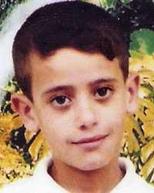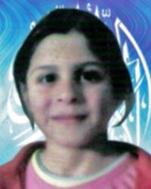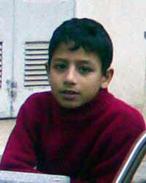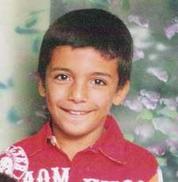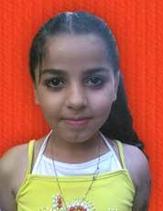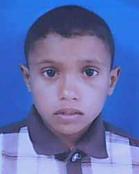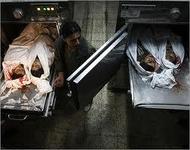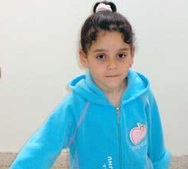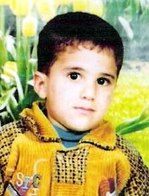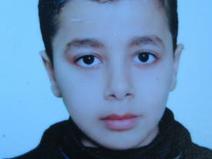
Ramadan al-Za'lan 9
Killed 9 dec 2011
and his eight-year-old bother is injured when their house is hit in an Israeli airstrike on Gaza City.
Nine-year-old Ramadan lived with his family in the Al Murabetin neighbourhood of Gaza City, near a training camp of Hamas’ military wing, Al Qassam Brigades. On the evening of 8 December 2011, “planes were bombing different targets in Gaza, and drone planes were circling overhead,” recalls Ramadan’s mother, Sa’da. “Their sound was very annoying and they interrupted the television signal, so my husband had to turn it off.”
“I prepared the beds as usual to put the children to sleep,” she continues. “That day, my husband had bought new blankets for the children, and Yousif and Ramadan started fighting to choose them. They were so excited about the new blankets. When they slept I went to bed with my husband and my little baby, Ahmad. Everything was quiet, and my husband told me that the training site had been evacuated in case there was bombing,” Sa’da explains.
At around 2:00 am, “I was half asleep breastfeeding Ahmad, when I felt the house was collapsing and rubble and stones falling on me. I covered Ahmad’s face and mine with the blanket to protect him, and immediately after that I heard an explosion shaking the entire place. More stones started falling on me, and the walls started collapsing. The window fell on my chest and abdomen. I turned my body to cover Ahmad. I was in a lot of pain and could not understand what was going on.”
The next thing Sa’da remembers is hearing the neighbours shouting, rescuing her and her family out from under the rubble. At the hospital, Sa’da regained consciousness and asked about her family. She was told that her husband had been killed, and both Yousif and Ramadan were being treated at the hospital. “I was discharged from hospital the next day at around 3:00 pm, and went back home to say goodbye to my husband before the burial. Later that day, at around seven in the evening, I received shocking news. People started crying around me and I asked: “Who died?” They said it was my son Ramadan.”
Speaking to DCI on 11 December 2011, Sa’da says: “I haven’t been able to cry. I couldn’t even cry when they brought Ramadan on Saturday for me to say goodbye. Yousif has been transferred to an Israeli hospital for further treatment... If he dies, I won’t be able to bear the loss of my two sons and their father. I am now living at my father-in-law’s house. Rima (3) was not injured but she spends her time sleeping. She opens her eyes and cries because she is very scared. She clings to me and cries herself to sleep. Iman (5) is still little but when you ask her about what happened, she says the house collapsed on us and her father went to heaven. She never mentions Yousif or Ramadan. She thinks the mourning tent in the neighbourhood is a party we are having because her father went to heaven. I should cry, right? But I cannot. I pray for Yousif to get better and come back home, and for God to have mercy on his brother and his father.”
Killed 9 dec 2011
and his eight-year-old bother is injured when their house is hit in an Israeli airstrike on Gaza City.
Nine-year-old Ramadan lived with his family in the Al Murabetin neighbourhood of Gaza City, near a training camp of Hamas’ military wing, Al Qassam Brigades. On the evening of 8 December 2011, “planes were bombing different targets in Gaza, and drone planes were circling overhead,” recalls Ramadan’s mother, Sa’da. “Their sound was very annoying and they interrupted the television signal, so my husband had to turn it off.”
“I prepared the beds as usual to put the children to sleep,” she continues. “That day, my husband had bought new blankets for the children, and Yousif and Ramadan started fighting to choose them. They were so excited about the new blankets. When they slept I went to bed with my husband and my little baby, Ahmad. Everything was quiet, and my husband told me that the training site had been evacuated in case there was bombing,” Sa’da explains.
At around 2:00 am, “I was half asleep breastfeeding Ahmad, when I felt the house was collapsing and rubble and stones falling on me. I covered Ahmad’s face and mine with the blanket to protect him, and immediately after that I heard an explosion shaking the entire place. More stones started falling on me, and the walls started collapsing. The window fell on my chest and abdomen. I turned my body to cover Ahmad. I was in a lot of pain and could not understand what was going on.”
The next thing Sa’da remembers is hearing the neighbours shouting, rescuing her and her family out from under the rubble. At the hospital, Sa’da regained consciousness and asked about her family. She was told that her husband had been killed, and both Yousif and Ramadan were being treated at the hospital. “I was discharged from hospital the next day at around 3:00 pm, and went back home to say goodbye to my husband before the burial. Later that day, at around seven in the evening, I received shocking news. People started crying around me and I asked: “Who died?” They said it was my son Ramadan.”
Speaking to DCI on 11 December 2011, Sa’da says: “I haven’t been able to cry. I couldn’t even cry when they brought Ramadan on Saturday for me to say goodbye. Yousif has been transferred to an Israeli hospital for further treatment... If he dies, I won’t be able to bear the loss of my two sons and their father. I am now living at my father-in-law’s house. Rima (3) was not injured but she spends her time sleeping. She opens her eyes and cries because she is very scared. She clings to me and cries herself to sleep. Iman (5) is still little but when you ask her about what happened, she says the house collapsed on us and her father went to heaven. She never mentions Yousif or Ramadan. She thinks the mourning tent in the neighbourhood is a party we are having because her father went to heaven. I should cry, right? But I cannot. I pray for Yousif to get better and come back home, and for God to have mercy on his brother and his father.”
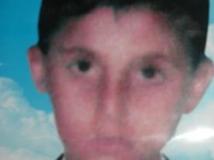
Mahmoud al-Jarou 9
Killed 8 apr 2011
Mahmoud lived with his parents and seven siblings in the ash-Shuja’iyeh area of Gaza City. At around 10:00 am on Friday, 8 April 2011, Mahmoud asked his father, Wael, to buy him sport shoes and a superman T-shirt.
‘He kept begging, so I finally agreed. We went shopping with my other son, Mohammad (14). I bought Mahmoud what he wanted and he was very excited. Then, we came home.’
At around 1:00 pm, after the Friday prayer, Mahmoud went to play in the cemetery near his grandfather’s house. ‘He often went there because he had many friends with whom he used to play football,’ explains Wael. At around 4:30pm, Wael heard people saying that ‘fighters were about to fire mortar shells from among the graves on the south side of the cemetery.’ He remembered that Mahmoud was playing there, so he rushed with his son Mohammad to bring Mahmoud home. When they arrived, they saw other children playing, but did not find Mahmoud. A drone place was circling overhead.
‘At that moment, there was a huge explosion about 40 metres away from me, and I saw heavy smoke and dust rising, as well as something like a human body flying in the air and landing on the ground. It was so horrifying that I sat down with my hands on my head for a few seconds. Then, I stood up and started running among the graves. (...) I ran for about 30 metres and kept searching among the graves, until I saw two legs on the ground. I realized they were Mahmoud’s because of the new shoes I had bought for him in the morning. I looked around and saw the rest of the body about five metres away. I ran to the body without knowing what to do. I will never forget what I saw. I saw his insides hanging out, and blood pumping from his stomach. I stood there shouting and hitting my head.’
Minutes later, an ambulance arrived. As the paramedic and a neighbour rushed toward Wael and his son’s body, there was another strike. ‘I saw dust rising, and we all threw ourselves on the ground. I stood up to see what had happened. I saw the paramedic on the ground. He then stood up and started running back towards the ambulance. I saw the other man on the ground. His head had been blown off and it was lying about five metres from his body. We all stood there shouting and crying waiting for another ambulance to arrive.’ Wael concludes: ‘I cry whenever I remember Mahmoud in the cemetery. It was a horrific scene. It’s really painful to see your son blown into pieces in front of you. When I said goodbye to him, his face was full of cuts and holes.’
Since the beginning of 2011, DCI has documented the deaths of six Palestinian children killed as a result of Israeli airstrikes and tank shells in the Gaza Strip. At least eight more have been injured. One of them, a three-year-old boy, is still in a critical condition.
Killed 8 apr 2011
Mahmoud lived with his parents and seven siblings in the ash-Shuja’iyeh area of Gaza City. At around 10:00 am on Friday, 8 April 2011, Mahmoud asked his father, Wael, to buy him sport shoes and a superman T-shirt.
‘He kept begging, so I finally agreed. We went shopping with my other son, Mohammad (14). I bought Mahmoud what he wanted and he was very excited. Then, we came home.’
At around 1:00 pm, after the Friday prayer, Mahmoud went to play in the cemetery near his grandfather’s house. ‘He often went there because he had many friends with whom he used to play football,’ explains Wael. At around 4:30pm, Wael heard people saying that ‘fighters were about to fire mortar shells from among the graves on the south side of the cemetery.’ He remembered that Mahmoud was playing there, so he rushed with his son Mohammad to bring Mahmoud home. When they arrived, they saw other children playing, but did not find Mahmoud. A drone place was circling overhead.
‘At that moment, there was a huge explosion about 40 metres away from me, and I saw heavy smoke and dust rising, as well as something like a human body flying in the air and landing on the ground. It was so horrifying that I sat down with my hands on my head for a few seconds. Then, I stood up and started running among the graves. (...) I ran for about 30 metres and kept searching among the graves, until I saw two legs on the ground. I realized they were Mahmoud’s because of the new shoes I had bought for him in the morning. I looked around and saw the rest of the body about five metres away. I ran to the body without knowing what to do. I will never forget what I saw. I saw his insides hanging out, and blood pumping from his stomach. I stood there shouting and hitting my head.’
Minutes later, an ambulance arrived. As the paramedic and a neighbour rushed toward Wael and his son’s body, there was another strike. ‘I saw dust rising, and we all threw ourselves on the ground. I stood up to see what had happened. I saw the paramedic on the ground. He then stood up and started running back towards the ambulance. I saw the other man on the ground. His head had been blown off and it was lying about five metres from his body. We all stood there shouting and crying waiting for another ambulance to arrive.’ Wael concludes: ‘I cry whenever I remember Mahmoud in the cemetery. It was a horrific scene. It’s really painful to see your son blown into pieces in front of you. When I said goodbye to him, his face was full of cuts and holes.’
Since the beginning of 2011, DCI has documented the deaths of six Palestinian children killed as a result of Israeli airstrikes and tank shells in the Gaza Strip. At least eight more have been injured. One of them, a three-year-old boy, is still in a critical condition.
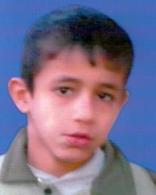
Abdullah Naji Hassanein 9
Killed 20 feb 2009
Place of martyrdom: in the yard of his house - Shijaia district - east of Gaza
Reason cited: the explosion of a mine left over from the war. Cast Lead
Killed 20 feb 2009
Place of martyrdom: in the yard of his house - Shijaia district - east of Gaza
Reason cited: the explosion of a mine left over from the war. Cast Lead
OPERATION CAST LEAD 27 DEC 2008-18 JAN 1009
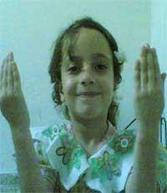
Su’ad ‘Abd Rabo 9
Killed 07-01-09
Killed when she left her house with her family, who were carrying white flags.
Suad Khaled Muhammad Abed-Rabo of Beit Hanoun, Gaza, killed, with her sister, by IDF tankfire to her chest after her family, waving white flags, left their home in Izbat Beit Hanoun to search for water.
Shortly after midday, soldiers from an Israeli tank ordered the family out of the house, according to her father, Khalid, 30.
There was gunfire from the tank and Amal and her sister Souad, seven, were killed immediately.
Another sister, Samar, four, was severely injured – she is now paralyzed in hospital in Belgium. Later, the soldiers demolished the house.
Other Information: When she was shot, Amal was carrying her favourite toy, a brown bear, which still lay in
the ruins.
Nothing was ‘surgical’ about Israel’s strikes except the 100s of amputations that followed.
The sordid case of Khaled Abed Rabbo is among the numerous instances of clearly unarmed civilians –who by all accounts of survivors were not in an area of ‘crossfire’ or ‘clashes’ –being shot point-blank by invading Israeli soldiers. In this case 3 out of 4 of the civilians were children: Amal, a 2 year old girl and Souad, a 9 year old girl, both shot dead; and Samar, a 4 year old girl, now paralyzed from her multiple shots. Abed Rabbo’s mother, also named Souad, was targeted, also at close range. All were denied medical aid.
Neighbour Samiah Al Sheekh had taken his ambulance only metres down the track between his home and that of Abed Rabbo’s when Israeli soldiers ordered him out, beat him, and using a bulldozer rammed the ambulance into Al Sheekh’s home.
“They put explosives by my home and destroyed the ambulance and my house,” he recounted.
Abed Rabbo has told whoever will listen about the murder of his children: “I tried to protect my children, to go back inside. They didn’t stop shooting,” he said, referring to the 3 Israeli soldiers by a tank outside his home who had ordered the family out then gunned them down. Particularly poignant in Khaled Abed Rabbo’s recollection of the moment is that the soldiers displayed a calm, leisurely snacking on junk food while ordering the residents of his home outside. Clearly, these armed soldiers felt no threat.
Hours after the shootings occurred and Khaled Abed Rabbo and family had carried the injured girls and grandmother over a mile to the main crossroads, Dawwar Zimmo, under still more Israeli soldier fire, he was finally able to flag down a car to take them to Kamal Adwan hospital, in Jabaliya. Amal and Souad arrived dead at the hospital.
Khaled Abed Rabbo, like 10s of other families throughout his neighbourhood, returned home to find his house destroyed, leveled by the explosives demolition that Israeli soldiers applied to the majority of the demolished homes in the area.
Killed 07-01-09
Killed when she left her house with her family, who were carrying white flags.
Suad Khaled Muhammad Abed-Rabo of Beit Hanoun, Gaza, killed, with her sister, by IDF tankfire to her chest after her family, waving white flags, left their home in Izbat Beit Hanoun to search for water.
Shortly after midday, soldiers from an Israeli tank ordered the family out of the house, according to her father, Khalid, 30.
There was gunfire from the tank and Amal and her sister Souad, seven, were killed immediately.
Another sister, Samar, four, was severely injured – she is now paralyzed in hospital in Belgium. Later, the soldiers demolished the house.
Other Information: When she was shot, Amal was carrying her favourite toy, a brown bear, which still lay in
the ruins.
Nothing was ‘surgical’ about Israel’s strikes except the 100s of amputations that followed.
The sordid case of Khaled Abed Rabbo is among the numerous instances of clearly unarmed civilians –who by all accounts of survivors were not in an area of ‘crossfire’ or ‘clashes’ –being shot point-blank by invading Israeli soldiers. In this case 3 out of 4 of the civilians were children: Amal, a 2 year old girl and Souad, a 9 year old girl, both shot dead; and Samar, a 4 year old girl, now paralyzed from her multiple shots. Abed Rabbo’s mother, also named Souad, was targeted, also at close range. All were denied medical aid.
Neighbour Samiah Al Sheekh had taken his ambulance only metres down the track between his home and that of Abed Rabbo’s when Israeli soldiers ordered him out, beat him, and using a bulldozer rammed the ambulance into Al Sheekh’s home.
“They put explosives by my home and destroyed the ambulance and my house,” he recounted.
Abed Rabbo has told whoever will listen about the murder of his children: “I tried to protect my children, to go back inside. They didn’t stop shooting,” he said, referring to the 3 Israeli soldiers by a tank outside his home who had ordered the family out then gunned them down. Particularly poignant in Khaled Abed Rabbo’s recollection of the moment is that the soldiers displayed a calm, leisurely snacking on junk food while ordering the residents of his home outside. Clearly, these armed soldiers felt no threat.
Hours after the shootings occurred and Khaled Abed Rabbo and family had carried the injured girls and grandmother over a mile to the main crossroads, Dawwar Zimmo, under still more Israeli soldier fire, he was finally able to flag down a car to take them to Kamal Adwan hospital, in Jabaliya. Amal and Souad arrived dead at the hospital.
Khaled Abed Rabbo, like 10s of other families throughout his neighbourhood, returned home to find his house destroyed, leveled by the explosives demolition that Israeli soldiers applied to the majority of the demolished homes in the area.
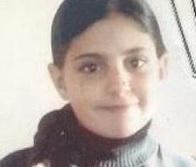
Lena Hassan 9
Killed 06-01-09
Killed by mortar fire that hit the street next to UNRWA’s al-Fakhura school, in the Jabalya refugee camp, where persons had gone for refuge having been forced to leave their houses.
At around 3:45pm, Israeli tanks shelled the perimeter of al-Fakhoura school, one of 37 schools operated by UNRWA in Jabalia refugee camp.
During Operation Cast Lead, the school was used to shelter displaced civilians who were trying to escape the fighting, or had been ordered to leave their areas of residence by the Israeli military, in northern Gaza. UNRWA had provided the Israeli army with the exact GPS coordinates of al-Fakhoura School.
The school was also included on a list of 91 provisional shelters that was communicated to the Israeli military before the start of the offensive. The Shells landed on the road just outside the school, killing 44 people, including 14 children.
On 6 January 2009, 12-year-old Hasan Hawila went out to the street after the afternoon prayer to play with the children from the al-Fakhoura neighbourhood, west of the Jabalia camp. Outside, he saw his cousin Ismail Hawila (16), and his friends Bilal Obaid (17), Bashar Naji (14) and Abdullah Abdullah (11), Mohammad Shaqoura (9) and Abdulla Baroud (11).
They were all playing marbles in the street. “I went straight to them to play marbles,” says Hasan. “The street was crowded with people because most of the residents of Beit Lahiya and Izbat Abed Rabbu had taken shelter in schools, including al-Fakhoura school.”
Suddenly, at around 3:45pm, there were three successive explosions. Hasan remembers: “The explosion rocked the whole area. I went down to the ground to protect myself from shrapnel scattering everywhere. I was about to stand up a few seconds later when a second explosion took place. There was a third explosion just one or two seconds after the second one.
I felt something hitting my left thigh. I felt myself flying in the air and thrown against the paved street.” When the dust and smoke faded, Hasan looked around. The scene was unbearable: “I kept looking around and saw many people on the ground. They all were bleeding. They were cut into pieces. I could not bear the scene. I was in extreme pain. I fainted.”
Minutes before the explosion, Ahmad Ma’rouf, who was sheltering in the al-Fakhoura school with his family, had given one Shekel [$0.25] to his son Ibrahim (14) go to the shop across the street. When he heard the explosions, he immediately rushed outside to look for his son:
“I saw more than 200 people on the ground. All of them were either dead or injured. I ran towards the shop opposite the school. I could not believe what I saw. People were on the ground near the school gate until as far as 200 metres away to the south. The ground was covered in blood.
I reached the shop and saw my son Ibrahim on the ground. I saw young men coming and quickly carrying him away. I ran after them to check on him and see whether he was dead or alive. They stopped an ambulance and drove him away. I kept running towards Kamal Odwan hospital, near the area [...] it was crowded with people. I went to the reception hall and saw dead and injured people on the floor. Beds were crammed with people. I saw my son Ibrahim on the floor. He was not moving. I realized he had died because of his injury.”
Wael Baroud (38) had just finished afternoon prayers with his neighbour when the shells struck. “The street at that time was crowded with people, children and young men from the neighbourhood and other neighbourhoods,” he says. As Wael was walking on the street, the place was targeted. His son, Abdullah (11), who was playing with his friends at the moment of the explosions, was injured:
Shahd Hussein Abou Sultan: Details of the last hours:
On the afternoon of Tuesday, the 6th of January, at a narrow alley, not wider than one meter, Shahd’s story ended.
On that cold day, eight-year-old Shahd walked around the streets looking for her father. He was sitting hidden with a friend, as the Israeli war on Gaza forced Palestinians to stay away from the streets.
Shahd sat in her father’s arms, searching for safety and peace.
Shahd was eating chips and sweets when an Israeli helicopter hovered above. As she played around where her father was sitting, a rocket from the helicopter shock the place. The father couldn’t protect his daughter, who died at once.
Shahd’s blood was flowing out, mixed with the father’s tears. The father was shocked watching his daughter’s blood on his own face and arms. The poor man suffered a horrible nervous breakdown, losing the ability to speak or move. Since that day, he is bedridden; not even able to mention his daughter’s name.
Her mother said “he is suffering from paralysis due to the terrible shock. He cannot imagine yet that Shahd was shot by an Israeli brutal bullet while she was between his arms feeding him and his friend from her sweets with her little soft hand.”
A couple of minutes before her death, Shahd was playing with her brothers and sisters, pretending to be an officer at the Rafah border crossing.
Shahd had a great sense of humor. She played all the time. Her mother and brothers still remember her in every corner. They remember her fun and friendly arguing with all of them. She had a strong personality, always trying to prove her point in an argument.
While Shahd was so young, her dreams were so big. She was whispering to her mother asking her when she will grow up to be like her elder sister, Soad.
While Shahd’s mother was talking about her memories with Shahd, Shahd’s sister, Shorouk, came back alone from school.
Shorouk was deeply depressed. “After two years of getting used to going to school with Shahd, who was in the second grade in the primary school, I am missing her now so much. I loved her a lot; every single detail in my day inside or outside home was shared by Shahd. Although she was younger than me, I always felt I can’t do anything without her.”
Shorouk loved her sister so much that she would see her in her dreams, flying with joyful wings, enjoying her life in paradise.
A similar dream was seen by her brother Mohammad, who also missed his sister so much
A better life after death is the only hope for those miserable children who have no hope to enjoy their lives; to live in peace like all kids around the world.
Killed 06-01-09
Killed by mortar fire that hit the street next to UNRWA’s al-Fakhura school, in the Jabalya refugee camp, where persons had gone for refuge having been forced to leave their houses.
At around 3:45pm, Israeli tanks shelled the perimeter of al-Fakhoura school, one of 37 schools operated by UNRWA in Jabalia refugee camp.
During Operation Cast Lead, the school was used to shelter displaced civilians who were trying to escape the fighting, or had been ordered to leave their areas of residence by the Israeli military, in northern Gaza. UNRWA had provided the Israeli army with the exact GPS coordinates of al-Fakhoura School.
The school was also included on a list of 91 provisional shelters that was communicated to the Israeli military before the start of the offensive. The Shells landed on the road just outside the school, killing 44 people, including 14 children.
On 6 January 2009, 12-year-old Hasan Hawila went out to the street after the afternoon prayer to play with the children from the al-Fakhoura neighbourhood, west of the Jabalia camp. Outside, he saw his cousin Ismail Hawila (16), and his friends Bilal Obaid (17), Bashar Naji (14) and Abdullah Abdullah (11), Mohammad Shaqoura (9) and Abdulla Baroud (11).
They were all playing marbles in the street. “I went straight to them to play marbles,” says Hasan. “The street was crowded with people because most of the residents of Beit Lahiya and Izbat Abed Rabbu had taken shelter in schools, including al-Fakhoura school.”
Suddenly, at around 3:45pm, there were three successive explosions. Hasan remembers: “The explosion rocked the whole area. I went down to the ground to protect myself from shrapnel scattering everywhere. I was about to stand up a few seconds later when a second explosion took place. There was a third explosion just one or two seconds after the second one.
I felt something hitting my left thigh. I felt myself flying in the air and thrown against the paved street.” When the dust and smoke faded, Hasan looked around. The scene was unbearable: “I kept looking around and saw many people on the ground. They all were bleeding. They were cut into pieces. I could not bear the scene. I was in extreme pain. I fainted.”
Minutes before the explosion, Ahmad Ma’rouf, who was sheltering in the al-Fakhoura school with his family, had given one Shekel [$0.25] to his son Ibrahim (14) go to the shop across the street. When he heard the explosions, he immediately rushed outside to look for his son:
“I saw more than 200 people on the ground. All of them were either dead or injured. I ran towards the shop opposite the school. I could not believe what I saw. People were on the ground near the school gate until as far as 200 metres away to the south. The ground was covered in blood.
I reached the shop and saw my son Ibrahim on the ground. I saw young men coming and quickly carrying him away. I ran after them to check on him and see whether he was dead or alive. They stopped an ambulance and drove him away. I kept running towards Kamal Odwan hospital, near the area [...] it was crowded with people. I went to the reception hall and saw dead and injured people on the floor. Beds were crammed with people. I saw my son Ibrahim on the floor. He was not moving. I realized he had died because of his injury.”
Wael Baroud (38) had just finished afternoon prayers with his neighbour when the shells struck. “The street at that time was crowded with people, children and young men from the neighbourhood and other neighbourhoods,” he says. As Wael was walking on the street, the place was targeted. His son, Abdullah (11), who was playing with his friends at the moment of the explosions, was injured:
Shahd Hussein Abou Sultan: Details of the last hours:
On the afternoon of Tuesday, the 6th of January, at a narrow alley, not wider than one meter, Shahd’s story ended.
On that cold day, eight-year-old Shahd walked around the streets looking for her father. He was sitting hidden with a friend, as the Israeli war on Gaza forced Palestinians to stay away from the streets.
Shahd sat in her father’s arms, searching for safety and peace.
Shahd was eating chips and sweets when an Israeli helicopter hovered above. As she played around where her father was sitting, a rocket from the helicopter shock the place. The father couldn’t protect his daughter, who died at once.
Shahd’s blood was flowing out, mixed with the father’s tears. The father was shocked watching his daughter’s blood on his own face and arms. The poor man suffered a horrible nervous breakdown, losing the ability to speak or move. Since that day, he is bedridden; not even able to mention his daughter’s name.
Her mother said “he is suffering from paralysis due to the terrible shock. He cannot imagine yet that Shahd was shot by an Israeli brutal bullet while she was between his arms feeding him and his friend from her sweets with her little soft hand.”
A couple of minutes before her death, Shahd was playing with her brothers and sisters, pretending to be an officer at the Rafah border crossing.
Shahd had a great sense of humor. She played all the time. Her mother and brothers still remember her in every corner. They remember her fun and friendly arguing with all of them. She had a strong personality, always trying to prove her point in an argument.
While Shahd was so young, her dreams were so big. She was whispering to her mother asking her when she will grow up to be like her elder sister, Soad.
While Shahd’s mother was talking about her memories with Shahd, Shahd’s sister, Shorouk, came back alone from school.
Shorouk was deeply depressed. “After two years of getting used to going to school with Shahd, who was in the second grade in the primary school, I am missing her now so much. I loved her a lot; every single detail in my day inside or outside home was shared by Shahd. Although she was younger than me, I always felt I can’t do anything without her.”
Shorouk loved her sister so much that she would see her in her dreams, flying with joyful wings, enjoying her life in paradise.
A similar dream was seen by her brother Mohammad, who also missed his sister so much
A better life after death is the only hope for those miserable children who have no hope to enjoy their lives; to live in peace like all kids around the world.
OPERATION CAST LEAD 27 DEC 2008-18 JAN 1009
